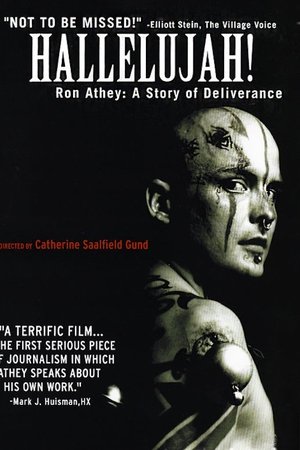Hallelujah! Ron Athey: A Story of Deliverance (1998) [N/A]
Featuring:
Ron Athey, Darryl Carlton, Vaginal Davis
Written by:
Catherine Gund
Directed by:
Catherine Gund
Release Date:
December 11, 1998
Original Title:
Hallelujah! Ron Athey: A Story of Deliverance
Genres:
Documentary
Ratings / Certifications:
N/A
Runtime: 90
Documentary exploring Ron Athey’s life and career as a queer HIV-positive body modification and performance artist, including several of Athey’s internationally staged works from the late 1990s.
Ron Athey is one of a number of performance artists who have generated a great deal of interest stemming not so much from the formal structure or thematic content of their works but because of their willingness to commit violence against themselves during the performance--by piercings, hypodermic injections, lacerations, and anything else they can think of. This documentary introduces the viewer to Ron Athey, humanizes him in the wake of all the dehumanizing rhetoric that was published in the popular press, and shows excerpts from several performances, almost all of which are, for the uninitiated at least, extremely unsettling. The movie has value in that it allows Athey to speak for himself and to explain why he has decided to do what he does, but, as a documentary done in the style where the filmmaker is apparently absent, there's no heated interview where Athey is confronted with criticisms. The work also could have been more fully placed in a historical or cross-cultural context. There is, for example, a history of religious performance which features the self-abuse of its actors--Shi'ite Moslems, for example, celebrate the holiday of Ashura with a parade of self-flagellating worshippers. We do see, obviously, how Athey takes gestures of mutilation from traditional Catholic iconography--the crown of thorns, the martyrdom of St. Sebastien--but it also would have been interesting to hear a dialogue of sorts between Athey and his critics, secular and religious--a dialogue taking place with an awareness that what Athey is doing, blasphemous as it may seem to some, has its parallels not only in religious history but in different contemporary religious practices. It also would have been interesting to hear Athey speak more explicitly about violence: In his moral framework, is it good, bad, or is its moral worth contingent on the intentions with which it is inflicted and/or received? Sometimes it sounds as though his work uses violence to force a witnessing of barbarism, to condemn violence, but at other times he seems to belittle aversions to violence, as when he compliments a dancer for not being "precious" with her body by displaying a willingness to risk her physical well-being. At any rate, it's a fascinating, difficult subculture, and "Hallelujah! Ron Athey" is an appropriate introduction to an artist who raises a number of complicated issues about art, mimesis, morality, religion, sanity, and their relation to one another.






